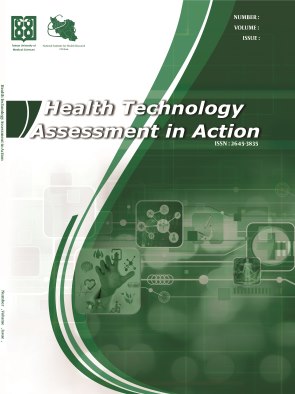Comparative Analysis of National Cancer Control Programs: Insights from Iran, USA, UK, Turkey, and Finland
Abstract
Background: National cancer control programs (NCCPs) are pivotal in addressing the global burden of cancer through prevention, detection, treatment, and supportive care strategies. Comparing the effectiveness of these programs is crucial for optimizing cancer care practices worldwide.
Objectives: This study evaluates NCCPs in Iran, the USA, the UK, Turkey, and Finland to provide insights into enhancing global cancer care practices.
Methods: We compared Iran’s NCCP with those of selected countries, focusing on key components including prevention, screening, diagnosis, treatment, supportive care, research, and registration. A systematic literature search identified relevant articles discussing NCCPs of Iran and comparison countries. Peer-reviewed journals and reputable databases were utilized for article retrieval. Inclusion criteria comprised English articles offering comprehensive information on NCCP components, while exclusion criteria involved articles not directly comparing NCCPs or lacking relevant data. Qualitative analysis of selected articles identified similarities and differences in program implementation and effectiveness. Grey literature and official government documents supplemented findings.
Results: Five studies on NCCPs from America, England, Finland, Turkey, and Iran were identified, revealing diverse approaches and shared objectives in global cancer treatment management. While comprehensive program components were similar across nations, nuanced differences emerged. More developed nations exhibited detailed strategies, while challenges such as treatment access and palliative care
integration persisted elsewhere. Variations in prevention initiatives, screening methods, treatment accessibility, and research funding mechanisms underscored the complexity of global cancer control efforts.
Conclusions: This study compares NCCPs in Iran, the USA, the UK, Turkey, and Finland. While all programs share common objectives, differences in strategies and resources exist. More developed nations often have detailed plans, while challenges like treatment access persist elsewhere. Variations in prevention, screening, treatment, and research underscore the complexity of global cancer care. By understanding these nuances, policymakers can better tailor NCCPs to address diverse population needs and improve cancer care outcomes worldwide.
2. DeSantis CE, Miller KD, Goding Sauer A, Jemal A, Siegel RL. Cancer statistics for african americans, 2019. CA: a cancer journal for clinicians. 2019;69(3):211-33.
3. Bray F, Ferlay J, Soerjomataram I, Siegel RL, Torre LA, Jemal A. Global cancer statistics 2018: GLOBOCAN estimates of incidence and mortality worldwide for 36 cancers in 185 countries. CA: a cancer journal for clinicians. 2018;68(6):394-424.
4. Kuan K. The Applications of Gold Nanoparticles in Cancer Diagnostics and Treatment. 2022.
5. Dieguez G, Ferro C, Pyenson BS. A multi-year look at the cost burden of cancer care. Millian Inc: New York, NY, USA. 2017:1-4.
6. Organization WH. Cancer control: knowledge into action: WHO guide for effective programmes: World Health Organization; 2007.
7. Howell D, Mayer DK, Fielding R, Eicher M, Verdonck-de Leeuw IM, Johansen C, et al. Management of cancer and health after the clinic visit: a call to action for self-management in cancer care. Jnci: journal of the national cancer institute. 2021;113(5):523-31.
8. Gabriele L, Buoncervello M, Ascione B, Bellenghi M, Matarrese P, Carè A. The gender perspective in cancer research and therapy: novel insights and on-going hypotheses. Annali Dell'istituto Superiore Di Sanita. 2016;52(2):213-22.
9. Schilsky RL, Nass S, Le Beau MM, Benz Jr EJ. Progress in cancer research, prevention, and care. The New England journal of medicine. 2020;383(10):897-900.
10. Knobloch K, Yoon U, Vogt PM. Preferred reporting items for systematic reviews and meta-analyses (PRISMA) statement and publication bias. Journal of Cranio-Maxillofacial Surgery. 2011;39(2):91-2.
11. Steele CB, Rose JM, Chovnick G, Townsend MJS, Stockmyer MCK, Fonseka MJ, et al. Use of evidence-based practices and resources among comprehensive cancer control programs. Journal of public health management and practice: JPHMP. 2015;21(5):441.
12. Boss LP, Suarez L. Uses of data to plan cancer prevention and control programs. Public Health Reports. 1990;105(4):354.
13. Landman A, Ling PM, Glantz SA. Tobacco industry youth smoking prevention programs: protecting the industry and hurting tobacco control. American journal of public health. 2002;92(6):917-30.
14. Wei K-R, Chen W-Q, Zhang S-W, Liang Z-H, Zheng R-S, Ou Z-X. Cancer registration in the Peoples Republic of China. Asian Pac J Cancer Prev. 2012;13(8):4209-14.
15. Abdul-Sater Z, Shamseddine A, Taher A, Fouad F, Abu-Sitta G, Fadhil I, et al. Cancer registration in the Middle East, North Africa, and Turkey: scope and challenges. JCO Global Oncology. 2021;7:1101-9.
16. Scher KS, Hurria A. Under-representation of older adults in cancer registration trials: known problem, little progress. Journal of clinical oncology. 2012;30(17):2036-8.
17. Lowery JT, Horick N, Kinney AY, Finkelstein DM, Garrett K, Haile RW, et al. A randomized trial to increase colonoscopy screening in members of high-risk families in the colorectal cancer family registry and cancer genetics network. Cancer epidemiology, biomarkers & prevention. 2014;23(4):601-10.
18. Habbema D, Weinmann S, Arbyn M, Kamineni A, Williams AE, MCM de Kok I, et al. Harms of cervical cancer screening in the United States and the Netherlands. International journal of cancer. 2017;140(5):1215-22.
19. Shaukat A, Rector TS, Church TR, Lederle FA, Kim AS, Rank JM, et al. Longer withdrawal time is associated with a reduced incidence of interval cancer after screening colonoscopy. Gastroenterology. 2015;149(4):952-7.
| Files | ||
| Issue | Vol 9 No 3 (2025) | |
| Section | Review Article | |
| DOI | https://doi.org/10.18502/htaa.v9i3.19644 | |
| Keywords | ||
| National Cancer Control Program (NCCP) Cancer Control Program Evaluation | ||
| Rights and permissions | |

|
This work is licensed under a Creative Commons Attribution-NonCommercial 4.0 International License. |




